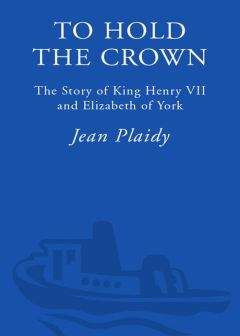Jean Plaidy - Mary, Queen of France: The Story of the Youngest Sister of Henry VIII
Sitting staring into space Mary did not notice the approach of her grandmother until the Countess was beside her, taking the piece of embroidery from her hands.
She started guiltily, and was sorry that her embroidery was so poor since it displeased her grandmother.
“This is not good,” said the old lady.
“I fear not, my lady.”
“You should work harder, my child.”
“Yes, my lady.”
Mary looked at the stern face before her, thinking how sad it was to be old, and that her grandmother was really ancient, because the King seemed an old man and he was her son.
“It would please your father if you showed more diligence. What will your husband think of a bride who cobbles with her needle?”
“He is but a boy, my lady,” replied Mary, “and as he is the heir of Spain and Flanders, I doubt he will weep over a piece of embroidery.”
“You are too pert, child.”
“Nay, my lady, I did not mean to be, for it is my opinion that Charles would as lief I had a strong healthy body to bear him sons than nimble fingers to embroider. There will be women enough for that.”
“And it may well be to perform both services.”
Mary looked startled. “Nay, Grandmother, I should never stomach a faithless husband.”
“That which could not be prevented would have to be endured. My child, you have much to learn. You remind me of your brother.”
“I am pleased to do so.”
“That is good. Tudors should stand together.”
“Have no fear, my lady. I should always stand with Henry.”
The Countess patted Mary’s hand. “It rejoices me to see this love between you. Always remember it, and when you are in a strange land do not forget that you are a Tudor and owe loyalty to your own.”
“I shall always be loyal to Henry.”
Margaret Beaufort, Countess of Richmond and Derby, took the needlework from her granddaughter’s hands and began to unpick the stitches. She was not particularly interested in the work but she did not wish those sharp bright eyes to read the emotion she feared she might betray. She was anxious on behalf of her son for whom she had lived since that day, over fifty years ago, when he had been born, a posthumous child; she had schemed for him, and the great goal of her life had been to see him on the throne of England. Few women could have seen such an ambitious dream come true; for it had been a great struggle and at one time it had seemed well-nigh impossible of achievement.
But there he was on the throne of England—her beloved son; and never would she forget the day when the news of what had happened on Bosworth Field was brought to her.
“Glory be to God,” she had cried; and often she asked herself, for she was a pious woman, whether then and on other occasions she had been guilty of idolatry; for never had a woman adored a son as she had her Henry.
He was well aware of it, being shrewd enough to know who was his best friend; and the woman who had been nearest and dearest to him during his years of struggle and of glory was his mother.
Now she was frightened, for she could see death creeping nearer and nearer; it had already set a shadow on those features, so cold and unprepossessing to others, so dear and beautiful to her.
How could she bear to go on living if her beloved son should be taken from her? What purpose would there be in life when for so long she had had only one ambition—to serve him?
He had shown her that she could still serve him, when he had read the thoughts in her melancholy eyes.
“Mother,” he had said, “you must stay close to the children to guide them, for they are young yet.”
“My beloved,” she had cried out in alarm, “they have the best of fathers to guide them.”
“They need their granddame. Henry is headstrong. I know full well that he approaches his eighteenth birthday but he is as yet a boy.” The King had sighed deeply. “I sometimes think that being so full of bodily vigor has made him over fond of useless pastimes. He is not as serious as I could wish. Margaret is in the care of her husband. And Mary …”
“Mary is like her brother—headstrong and greatly indulged by all.”
“She needs a strong hand. I have tried to wean her from her frivolity.”
“You love her too dearly, my beloved. She is sharp and knows well how to play on your feelings.”
“But, Mother, I have never been a tender father. At times I have watched children and their parents and I have said to myself: Mine never run to me in that fashion. Mine never laugh with me like that.”
“You are King and no child ever had a better father.”
“I have heard my wife tell her children stories of her childhood, of the gaiety of her father … and he was a king.”
“You have been a good father to your children, Henry.”
But he was sad. A sign that he was growing more and more infirm. He was remembering certain acts which had taken place during his reign, and was wishing they had not. He even regretted some of the methods by which he had extorted money from his subjects. As if it had not been important to build up a rich exchequer! thought his mother. As if he had not taken all for the glory of his country and never for himself! How much had he ever spent on fine raiment? Had he ever frittered away one golden crown on senseless pleasure?
She was thinking of this now as she picked at the stitches in Mary’s woeful work. Mary watched her in silence, sensing her mood and half understanding what had inspired it; but she could not help thinking: But if my father dies there will still be a king of England. And it was so much more pleasant to picture young Henry, resplendent in purple velvet and ermine, than old Henry, withered with disease.
“Mary, my child.”
“Yes, my lady.”
“The King suffers much in health.”
Mary nodded.
“He loves you dearly. Why do you not go to him and show a little tenderness?”
Mary’s lovely blue eyes were wide with astonishment. “Go to the King!” she cried.
“Forget he is the King for a while. Remember only that he is your father. Go to him, and when you have knelt and kissed his hand, put your arms about his neck, tell him that you have ever loved him dearly and that he has been a good father to you.”
Mary shrank away. Was her grandmother serious? Was she raving? One did not go to the King and put one’s arms about his neck. Even his favorite daughter could not do that.
“He would be a little startled at first,” went on her grandmother, “and then he would be so happy. Mary, your father is a great king; he took this bankrupt kingdom—which was his by right—he took it from the usurper Richard, and he made it rich and strong. Such a task was a great tax on his energies and he had little time to laugh and frolic. Perhaps this has made you feel that he is over-stern. But go to him and tell him how much you love him.”
Mary was pensive. It would not be easy, for she, who was always spontaneous, would find it difficult to play a part, and in truth she had no great love for her father.
Her grandmother put the embroidery into her lap and rising, kissed her. Then she went away as though in a great hurry.
Mary paused outside her father’s apartments.
“My lady,” said the page, “His Grace is with his ministers.”
Mary turned away relieved. She had been rehearsing what she would say, and it sounded false to her; she was glad the need to say it was postponed.
The King asked who was at the door, and when told it was the Lady Mary he smiled.
She had some request to make, he thought. What does she wish? Some new bauble? She grows more like her brother every day.
Yet he had a yearning to see the pretty creature; and if it were a new gown or even a jewel she wanted he would perhaps grant her her wish; but he must impress upon her the need for sobriety and explain that all the extravagant display, which had accompanied her nuptial celebrations, had not been for personal vainglory but to show to foreigners that England was wealthy, because wealth meant power.
He turned back to the task before him. He had decided that all those who had been imprisoned in London for debts of under forty shillings should be discharged.
He was beginning to be tormented by remorse when he contemplated the extortions, which Dudley and Empson had committed in his name; and now that his conscience was beginning to worry him on this score, he realized that he was a very sick man indeed.
There were cowslips in the meadows near Richmond and the blackthorn was in blossom. The air was enlivened by birdsong, and all this meant that it was the month of April and spring had come.
But in the Palace the old era was ending and the new one had not yet begun.
The fifty-two-year-old King lay on his bed and thought of his subjects; he wondered ruefully how many of them would shed a real tear at his passing.
Fifty-two. It was not really old; yet he had lived a full life and there was so much of it that he wished he had lived differently. He had recently pilgrimaged to Our Lady of Walsingham and to Saint Thomas of Canterbury, and there he had sworn to build a hospital for the sick poor.
Time! he thought. I need time. He hoarded time as once he had hoarded gold; he was fighting with all his strength to hold off death a little longer until such time as he could make peace with himself.
But death would not wait.
Mary came to his apartments, planning what she would do and say. She would go to his bed and put her arms about his neck. “I will not call you Your Highness, but Father,” she would tell him. “Oh, Father, we do love you … Henry and I. We understand that it was necessary for you to be stern with us. We love to dance and play and we often forget our duty … but we want to be good. We want to be the sort of children of whom you can be proud.”
Did that sound false? For false it was. Neither she nor Henry wanted to be anything but what they were.
“It is the Lady Mary,” said one of the pages to another.
“I have come to see my father.”
“My lady, the priests are with him.”
Holy Mother, thought Mary, is it then too late?
His body had been taken from Richmond to Westminster, but not with any speed for, although he died on the 21st day of April, he was not moved until the 9th of May.
There was reason for the delay. An image of him in wax must be made ready to be clad in his robes of state and placed in the coffin, and remain there during the funeral, holding the ball and scepter in its hands. The chariot which would hold the coffin had to be covered in black cloth of gold; and all those noblemen who lived far from Court must be given time to arrive for the ceremony.
It was to be a grand funeral. The King had left money to pay for masses which were to be said for his soul, as he asked, for as long as the world should endure. He had become very uneasy during his last days on earth when he had realized that he would not have time to make all the amends he had planned.
The new King had already left Richmond for the Palace of the Tower. That was well, because he found it difficult to hide his elation. His father was dead and he had been a good father; but what a stern one! And had he not treated his son as though he were a child?
Freedom! thought Henry VIII, dreaming of his future.
And Mary, while she prayed for the soul of her father, could not prevent her thoughts wandering as she considered what a change this was going to make to all their lives.
It was a great occasion when the funeral cortège passed through the capital. At London Bridge the Mayor and the City Companies received it and merchants mingled with apprentices in the crowds which followed it to St. Paul’s.
As was the custom with the dead, people remembered virtues rather than failings.
And when all was considered, his epitaph was as good as any king could hope to achieve.
“He brought us peace,” said the people.
Yet never had they cried: “The King is dead. Long live the King!” with more hope, more exultation than they did in those spring days of 1509.
The sorrowing Countess of Richmond sat with her grandchildren. She had an arm about the girl but her eyes were on the boy.
“It was your father’s wish that I should continue to guide you, Henry,” she explained. “My dear grandson, you will find the task before you not always a glorious one. There is more to kingship than riding through streets and listening to the cheers of the crowd.”
“I know it well,” answered Henry, not as coolly as he would wish, for he was still in awe of his grandmother.
“So I shall always be at hand to give you my counsel and, remembering your father’s wish, I trust you will consider it.”
Henry took her hand and kissed it.
He would always remember, he assured her.
And Mary, seeing the shine in his eyes, knew that his thoughts were far away in the future. He was looking at freedom stretching out before him—glorious, dazzling freedom. He was eighteen and King of England. At this moment he was too much intoxicated by the joy of being alive himself to think of anything else.
Oh, thought Mary, it will be wonderful now he is King! England will be merry, as she was meant to be, and all the country will be in love with such a sovereign.
A cold fear crept into her mind. And where shall I be? How much longer can I hope to remain in England? Am I forgetting that, over the sea, a bridegroom is waiting for me? But not yet … not yet.
She was too much of a Tudor not to live in the moment.
Mourning for King Henry VII could not be expected to last long when there was a young handsome man waiting to put on the crown.
Hope was high throughout London and the country. There would be joy such as had never been known before; gone were the days of high taxation. He had shown his intentions by throwing Empson and Dudley—those notorious extortioners—into the Tower; he had proclaimed that many debtors to the crown would be excused. He made it clear that he wanted the old days of anxiety to be forgotten, that the merry era might begin without delay.
He rode through the streets, this golden boy, and often the Princess of Castile rode with him; he so handsome, she so lovely; and the crowds cheered themselves hoarse for these charming young people.
There was another who rode with the King, for he had decided after all to marry his brother’s widow, and this was a match which found favor with the people, for Katharine was known to be meek and serious by nature; the fact that she was a few years older than her bridegroom seemed favorable too. She will steady him, said the people. For he is gay and over merry, bless him. It will be good for him to have a serious wife.
So the days of mourning were quickly over, for how could the people mourn when they were about to see their King and Queen crowned?
On the eleventh of June—less than two months after his father’s death—Henry married Katharine and the coronation of the pair was arranged for the twenty-fourth of that month.
Mary, who was then three months past her thirteenth birthday, must of course take a prominent part in the celebrations.
What a joy it was to ride in the procession from the Tower to Westminster, to see Archbishop Warham anoint the head of her beloved brother.




